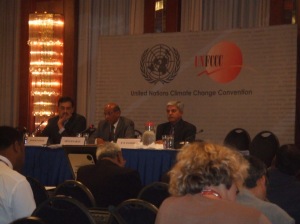World
The economics of climate change in Southeast Asia: a regional review
Posted on 13 Jul, 2009 09:53 AMClimate change will affect everyone but developing countries will be hit hardest, soonest and have the least capacity to respond. South East Asia is particularly vulnerable to the impacts of climate change with its extensive, heavily populated coastlines, large agricultural sectors and large sections of the population living under $2 or even $1 a day.
Database of threatened lakes
Posted on 07 Jul, 2009 03:18 AM CSE (Center for Science and Environment, www.cseindia.org ) has created an interactive database on threatened lakes of India.
CSE (Center for Science and Environment, www.cseindia.org ) has created an interactive database on threatened lakes of India.
The “Bonn” of contention
Posted on 06 Jul, 2009 06:54 AMAs the Bonn climate talks have come to a close we would like to bid farewell to frequent long blog posts and continue to facilitate a knowledge dialogue with our negotiators and key officials who have a direct stake in the process to forming our Bonn of contention for 10-14th August when all climate leaders would be meeting again. [caption id="" align="alignleft" width="300" caption="Dr.Shyam Saran at the press conference"] [/caption] For India, since only a very limited population has its outreach in the internet world, we plan to get the word out through vernacular media into different and remote regions of India. Considering India has around 20 official languages and over 100 different dialects, we pay respect to our rich diversity by approaching outreach through radio and local language newspapers along with blogging. On 12th of June, Mr Shyam Saran was extremely unhappy with the pace at which the negotiations were proceeding, as he said so in the press conference he held at the UNFCCC negotiations. Through the various meetings at Bonn and some post Bonn meetings with some high level officials involved associated with the delegations, the following main points came through:
[/caption] For India, since only a very limited population has its outreach in the internet world, we plan to get the word out through vernacular media into different and remote regions of India. Considering India has around 20 official languages and over 100 different dialects, we pay respect to our rich diversity by approaching outreach through radio and local language newspapers along with blogging. On 12th of June, Mr Shyam Saran was extremely unhappy with the pace at which the negotiations were proceeding, as he said so in the press conference he held at the UNFCCC negotiations. Through the various meetings at Bonn and some post Bonn meetings with some high level officials involved associated with the delegations, the following main points came through:
Post-doctoral research positions: UNESCO-IHE
Posted on 03 Jul, 2009 09:41 PMForwarded to the Portal by Ewoud Kok, UNESCO-IHE ====  The UNESCO-IHE Partnership Research Fund announces an interdisciplinary post-doctoral research programme to investigate the many challenges of adapting to climate change from different water related perspectives.
The UNESCO-IHE Partnership Research Fund announces an interdisciplinary post-doctoral research programme to investigate the many challenges of adapting to climate change from different water related perspectives.
Climate change treaty : The deal of our life
Posted on 16 Jun, 2009 12:49 AMDecember this year in Copenhagen the countries of the world are going to sign a treaty that will change our life as we know it. Their commitments today will affect our quality of life tomorrow.
UNDP water governance facility at SIWI newsletter!
Posted on 06 Jun, 2009 10:32 AMForwarded to the Portal by: Josh Paglia, SIWI 
The UNDP Water Governance Facility (WGF) at the Stockholm International Water Institute (SIWI) is a unique initiative that supports developing countries in their efforts to strengthen water governance and reduce poverty through policy support and advisory services. The latest newsletter from the Water Governance Facility provides updates on activities initiated & much more.
Some highlights are: WGF in Action: From the World Water Forum
At the 5th World Water Forum, 15-22 March, Istanbul, WGF participated in several events. At the seminar Beyond Water Bribes: How to build a corruption-resistant water sector Dr. HÃ¥kan Tropp gave a key note presentation Corruption: The Missing Link in Water Governance. WGF also co-authored parts of the World Water Development Report, 2009: Water in a Changing World, and attended its launch 16 March.
Decentralised wastewater treatment in developing countries - A handbook by BORDA
Posted on 05 Jun, 2009 12:36 PMThis handbook published by Bremen Overseas Research and Development Association (BORDA) is an outcome of a project titled “Low Maintenance Wastewater Treatment Systems - LOMWATS; Development of Technologies and Dissemination Strategies.” The project had been financed by the Commission of the European Union, with substantial contribution by the State Office for Development Co-operation of the Free Hanseatic City of Bremen from October 1994 until April 1998.
This book aims at a target group, which is typical for decentralised technology implementation and consists of people who are aware of the general problem and know something about possible solutions. However, their knowledge is too general on one hand, or too specialised on the other to master very typical problems which go together with decentralisation.
Water and democracy - proceedings of the partner consultation by Evangelischer Entwicklungsdienst (EED) and Centre for World Solidarity (CWS)
Posted on 04 Jun, 2009 05:22 PMThe purpose of the consultation was also to identify areas of collaboration in advocacy, capacity building and working with people at the grassroot levels and simultaneously influence policy-making at the local, regional and international levels. The objectives of the workshop were -
Environmental flows are essential for freshwater ecosystem health and human well-being - the Brisbane Declaration
Posted on 04 Jun, 2009 02:05 PMThis declaration presents summary findings and a global action agenda that address the urgent need to protect rivers globally, as proclaimed at the 10th International River symposium and International Environmental Flows Conference, held in Brisbane, Australia, on 3-6 September 2007. The conference was attended by more than 800 scientists, economists, engineers, resource managers an